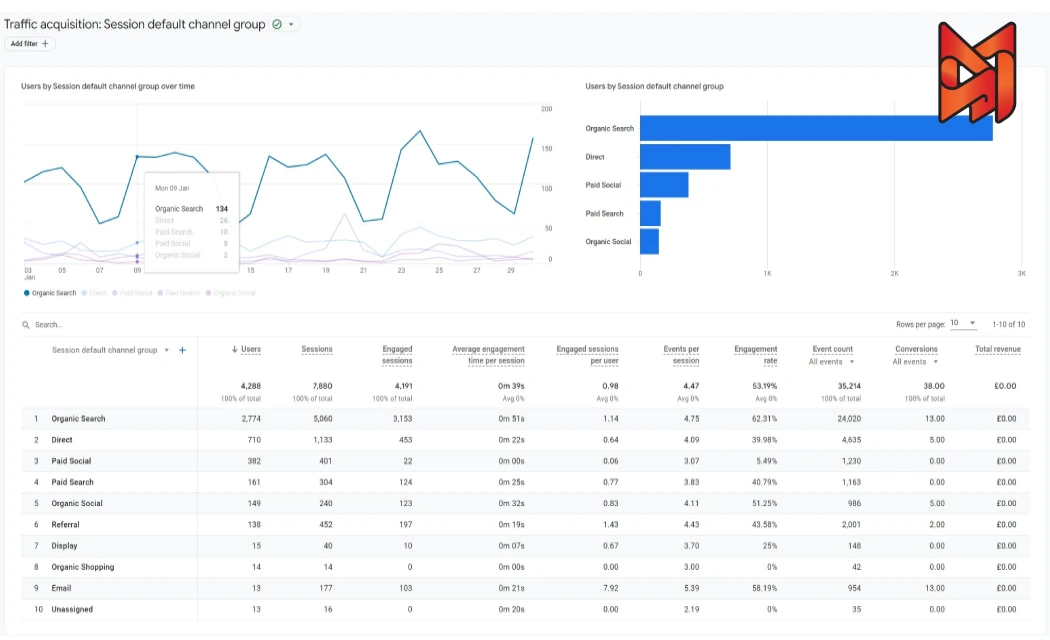SEO performance indicates how well your site ranks on search engines like Google and attracts organic visitors. There are several key metrics to monitor when assessing your SEO efforts. Below, we will explore 11 ways of tracking SEO to measure your progress.
1. Organic Visitors
The first metric in tracking seo is organic visitors. Organic visitors are individuals who land on your site through unpaid search engine results. This metric indicates how effectively your pages rank for terms searched by your audience and how many of those visits have the potential to convert into customers. To monitor organic visitors, utilize Google Analytics 4. Go to “Reports” > “Acquisition” > “Traffic Acquisition.”
Set the date range for the previous month. Check the number of sessions (visits) listed under “Organic Search.”
To assess your performance, compare your figures against those of competitors. Utilize a tool like Traffic Analytics, enter your competitors’ domains, and click “Analyze.”
Search field in Traffic Analytics
Ensure that the time frame aligns with your Google Analytics data. Scroll to the “Traffic Sources” section, hover over “Organic Search,” and observe your competitors’ organic visitor counts.
Widget showing competitors’ organic search traffic
If competitors are significantly ahead, perform a competitor analysis to identify their strategies, including the keywords they emphasize and the content they create. Then, make a strategy to surpass them.
2. Keyword Positions
A keyword position refers to where your site is located on a search engine results page (SERP) for a specific term. If you want to learn more about Google page rank, read our article on this topic. Higher positions typically drive more clicks and visitors to your site.
However, rankings may change due to algorithm updates, lost backlinks, or competitors enhancing their pages. Monitoring your rankings helps you identify drops that could diminish your traffic and revenue.
To track positions, use a tool such as Google Search Console

3. Search Engine Visibility
Search engine visibility indicates how frequently and prominently your site appears in search results for relevant terms. It considers keyword positions and unique SERP features such as featured snippets, image carousels, and knowledge graphs.
4. Search Impressions
Impressions indicate how often your site appeared in search results during a specified period. This metric demonstrates whether your SEO efforts are boosting your site’s visibility. Increasing impressions often suggest early SEO success. You can monitor impressions in Google Search Console under the “Search Results” report.
Search Results report in Google Search Console
You will see the total impressions for the selected time frame. Switch to the “Pages” tab for a page-by-page breakdown. With proper optimization, impressions should increase as your pages rank higher and appear for more queries.
Dimarketo, a leading digital marketing agency in Dubai, offers comprehensive SEO services tailored to elevate businesses in the competitive UAE market. Specializing in strategies that align with local and global search trends, Dimarketo helps clients boost their online visibility, drive organic traffic, and achieve higher rankings on search engines like Google.
Our SEO services in Dubai include keyword research, on-page and off-page optimization, content creation, and technical SEO audits, all customized to meet the unique needs of Dubai businesses. With a data-driven approach and a deep understanding of the region’s dynamic market, Dimarketo ensures measurable results, making it a trusted partner for companies aiming to thrive digitally.
5. Click-Through Rate
The other metric in tracking seo is CTR. Click-through rate (CTR) is the percentage of searchers who click on your site from the SERP. It indicates how compelling your page titles and descriptions are. To calculate CTR, divide the number of clicks by the number of impressions and multiply by 100. For example, 10 clicks out of 100 impressions equals a 10% CTR.
To check CTR, open Google Search Console and go to “Search Results” under “Performance.”
Search Results report
Select “Average CTR” to view your site’s rate. For page-specific data, scroll to the “Pages” tab.
To improve CTR:
- Utilize engaging title tags that incorporate words such as “top,” “easy,” or “proven.” Include numbers or brackets and keep titles under 55 characters to prevent truncation.
- Create meta descriptions that use action phrases like “discover,” “explore,” or “learn,” ensuring they remain under 105 characters.
6. Goal Completions
A goal completion (or conversion) occurs when a visitor takes a desired action, such as signing up, downloading, or purchasing a product. High completion rates indicate that your site effectively converts visitors into leads or customers.
Completions are referred to as “key events ” in Google Analytics 4. Follow Google’s guide to set them up, and then track completions from organic visitors in “Reports” > “Acquisition” > “Traffic Acquisition.”

Traffic Acquisition report
You’ll see the key event rate for organic search and other channels.
To increase completions:
- Utilize strong, clear calls to action (CTAs).
- Streamline forms and checkout processes.
- Implement pop-ups to engage visitors before they exit.
7. Exit Rate
Exit rate refers to the percentage of visitors who leave your site after viewing only one page. It indicates how well your content engages visitors or meets their expectations.
High exit rates might suggest problems such as slow loading times, a poor mobile experience, or discrepancies between keywords and content.
To track the exit rate in SEO, check the exit rate in Google Analytics 4. Go to “Reports” > “Life Cycle” > “Engagement” > “Pages and Screens.”
Pencil icon in the report
Under’ Metrics,” select’ Bounce Rate” (used for exit rate) and apply it.
Compare your rate to competitors using Traffic Analytics by entering their domains and clicking’ Analyze.” Scroll down to’ Trend by Competitors” and select’ Bounce Rate” to view a graph.
To lower your exit rate:
- Align content with search intent.
- Enhance readability and navigation.
- Include internal links to direct visitors to other pages.
8. Site Authority
Site authority measures how likely your site is to rank well in search results. Check your score with tools like Domain Overview or the free Website Authority Checker. Compare your score to competitors’ using Backlink Analytics. Enter your domain, add competitors, and click “Compare.”
Focus on improving by acquiring high-quality backlinks, as explained below.
9. Inbound Links
Another metric in tracking seo is inbound links. Inbound links (backlinks) are links from other sites linked to yours. They indicate trust and value to Google, making them a crucial factor for ranking. You can track backlinks using Backlink Analytics. Enter your domain and click Analyze.
Build more links with tactics like:
- Creating shareable content, such as guides and infographics.
- Emailing websites to request backlinks.
- Fixing broken links on various websites.
- Converting unlinked brand mentions into hyperlinks.

10. Technical Performance
Strong technical performance allows search engines to crawl, index, and rank your pages effectively. It also impacts load speed and mobile usability—both essential for rankings. If you want to learn about what is technical SEO, read our article on this topic.
11. Time Spent on Page
The last metric in tracking seo is time on page. Time spent on a page (or engagement time) refers to the average duration visitors focus on your content. This metric indicates whether your material meets searchers’ needs. Longer engagement times suggest that your page satisfies intent, while shorter durations may signal a mismatch. You can track this in Google Analytics 4 under “Reports” > “Engagement” > “Pages and Screens.” Look for “Average Engagement Time.”
How Long Until SEO Pays Off?
SEO takes time—think about it in months, not weeks. Results depend on your site’s age, the quality of your strategy, and consistency. With a solid approach, expect progress in 4 to 12 months. Your competitors and target keywords also influence outcomes.
Monitor metrics regularly, adjust your strategy based on data, and prioritize long-term gains over short-term wins.
Final Thoughts
Tracking SEO effectiveness is crucial for understanding your site’s performance and identifying areas for improvement. By monitoring metrics like organic traffic, keyword rankings, CTR, and conversions, you obtain actionable insights to enhance your strategy. Combine these efforts with competitor analysis and technical optimization to retain an advantage in search rankings. SEO is a marathon, not a sprint—patience, consistency, and data-driven decisions will yield lasting success. If you need SEO services in Dubai, contact dimarketo today.





